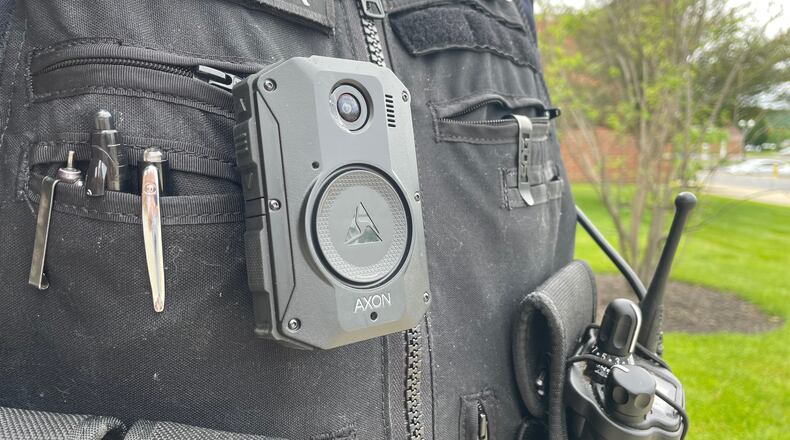Chief Deputy Anthony Dwyer said putting out the RFP will “tell us a little bit more about the number of cameras we can get and how we’re going to operate this.” There are 320 sworn officers who could potentially wear the recording devises, including patrol, the jail, detectives, school resource officers and others.
The application did not include additional staff to manage the records and Dwyer said at this early stage he isn’t sure if they’ll need it, but records retention is no easy matter.
“By all accounts it can be very difficult to manage because it is a lot of data,” Dwyer said. “And public records laws are so open it gives rise to people filing just to file.”
He said they get records requests all the time — even from drivers who were cited for minor traffic violations — and sometimes those requests take hours even days to fulfill.
Jones and police chiefs from Fairfield Twp., Middletown and West Chester Twp. were among 112 police agencies statewide vying for $5 million in the second round of funding Gov. Mike DeWine made available for body cameras last year. They asked for a total of $492,483 and received $282,951.
DeWine’s office indicated 44 agencies statewide will use funding to create new body-worn camera programs and 68 will dedicate funding toward expanding or upgrading existing technology. Jones and Middletown Police Chief David Birk wanted to start new programs.
Middletown applied for $185,161 in the first round of funding last year for 78 cameras, software and one records redaction specialist. Birk requested $124,218 and received $49,608 in the second round in December.
He told the Journal-News he has to rescind his grant because the city can’t afford the redaction specialist.
“I’m disappointed, we were kind of planning, we had a policy we were getting ready to look at it,” Birk said. “But unfortunately I understand everything revolves around budgeting and costs.”
Birk said the city manager informed him they couldn’t afford an additional person prior to the fatal officer involved shooting at Walmart last month. He said after they were notified the deadline to withdraw from the grant had been extended to March 17, he tried again.
“I forwarded that back to the city manager just to think after we had that incident at Walmart, maybe they would feel that it’s necessary to move forward now, but I haven’t heard anything,” Birk said.
Lindsey Bohrer, a spokesperson for the Ohio Department of Public Safety said they have not been notified any jurisdictions need to withdraw their grant awards. Birk said they are waiting until the deadline next week to send the withdrawal, unless the city has a change of heart.
Dwyer said they might have to go to the commissioners to ask them to supplement the program. Commissioner T.C. Rogers told the Journal-News he knew the grant wouldn’t cover everything and while he is not convinced the devises are conclusive, “I will support the sheriff as I always have if he makes a clear case that it’s needed.”
Commissioner Don Dixon said he understands the cameras are now a necessary expense.
“In today’s world and the times and the way law enforcement has to deal with people, the types of situations, I don’t like it but I don’t like a lot of things we have to do now,” Dixon said. “But I think we need to do it, I see the need coming, we’re fortunate in Butler County we don’t have a lot of crime like other areas, but it’s going to happen so we might as well build it the best way we can, the most economical way we can.”
For years Butler County police departments shied away from body cameras because of the cost and the uncertainty about what needs to be retained as a record, what should or cannot be redacted and other privacy issues.
Jones was one of the most vocal against the devises. He and told the Journal-News when he applied for a $280,000 state grant two years ago when there are officer involved shootings in big cities during uprisings “the videos are released that exonerate the police and it doesn’t stop, they still don’t believe it.”
He said there is already transparency on his police force but if they get the money he’ll take it, because he believes at some point in time he may be mandated to do so.
Fairfield, Fairfield Twp., Miami University, Monroe, New Miami, Oxford and West Chester Twp. have had the technology for a while.
When Fairfield Twp. won $18,865 from the grant in December, Police Chief Bob Chabali said the cameras have been “incredibly” invaluable and pointed to the officer involved shooting in their township last year as a prime example.
“They validate our officers actions when we have had complaints,” Chabali said. “It also has assisted in evidence for our officers when they go to court, it actually caught the shooting that we had on body cam which is instrumental for the investigators and the grand jury to look at. The officers actually want them because it protects from false accusations.”
About the Author

